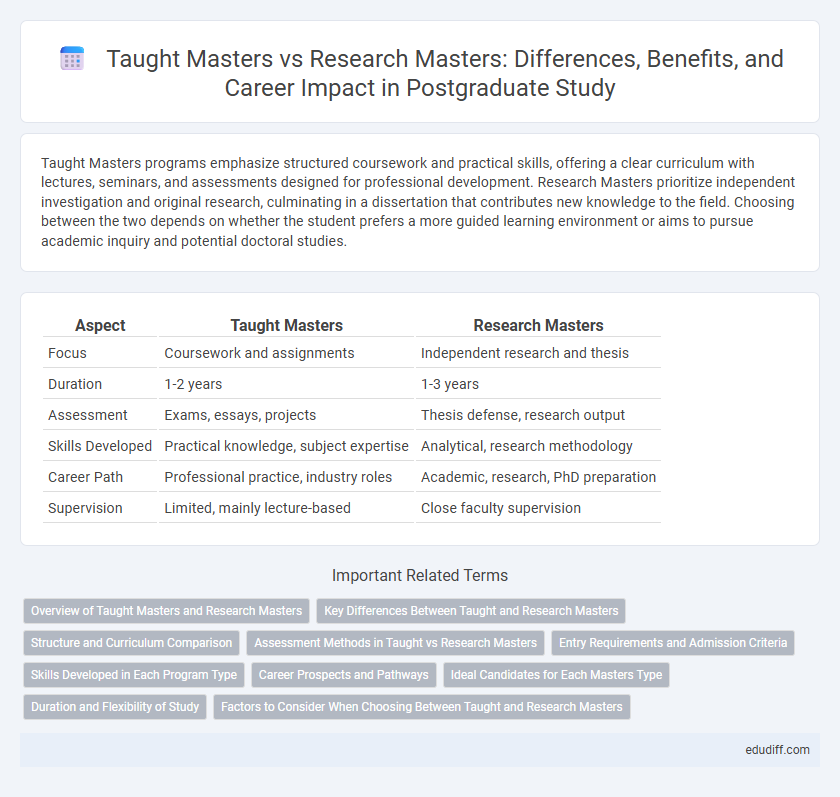Taught Masters programs emphasize structured coursework and practical skills, offering a clear curriculum with lectures, seminars, and assessments designed for professional development. Research Masters prioritize independent investigation and original research, culminating in a dissertation that contributes new knowledge to the field. Choosing between the two depends on whether the student prefers a more guided learning environment or aims to pursue academic inquiry and potential doctoral studies.
Table of Comparison
| Aspect | Taught Masters | Research Masters |
|---|---|---|
| Focus | Coursework and assignments | Independent research and thesis |
| Duration | 1-2 years | 1-3 years |
| Assessment | Exams, essays, projects | Thesis defense, research output |
| Skills Developed | Practical knowledge, subject expertise | Analytical, research methodology |
| Career Path | Professional practice, industry roles | Academic, research, PhD preparation |
| Supervision | Limited, mainly lecture-based | Close faculty supervision |
Overview of Taught Masters and Research Masters
Taught Masters programs emphasize structured coursework and practical assignments, typically lasting one to two years, designed to develop specialized knowledge and skills in a specific subject area. Research Masters prioritize original research, culminating in a thesis or dissertation, and are ideal for students aiming to pursue academic or research-oriented careers. Both pathways offer distinct academic experiences tailored to different career goals and learning preferences.
Key Differences Between Taught and Research Masters
Taught Masters programs emphasize structured coursework and regular assessments, offering students a clear curriculum spanning core and elective modules, ideal for those seeking practical knowledge and professional skills. Research Masters prioritize independent study, requiring candidates to conduct original research and produce a substantial thesis, suitable for those aiming for academic or research careers. Assessment methods differ significantly: Taught Masters rely on exams and assignments, whereas Research Masters evaluate through thesis quality and oral defenses.
Structure and Curriculum Comparison
Taught Masters programs typically consist of structured coursework, including lectures, seminars, and assignments, culminating in examinations or practical assessments. Research Masters emphasize independent study, requiring students to conduct original research under supervision, often leading to a thesis or dissertation. The curriculum of Taught Masters is designed to provide comprehensive knowledge across specific subjects, while Research Masters focus on developing specialized expertise and advanced research skills within a narrower field.
Assessment Methods in Taught vs Research Masters
Assessment methods in Taught Masters programs primarily involve coursework, exams, and practical assignments designed to evaluate theoretical knowledge and applied skills within a structured curriculum. In contrast, Research Masters emphasize thesis writing, original research projects, and oral defenses, assessing the candidate's ability to conduct independent scholarly investigation and contribute new insights to their field. The differing assessment formats reflect the distinct educational goals, with Taught Masters focusing on mastery of established knowledge and Research Masters prioritizing research competence and innovation.
Entry Requirements and Admission Criteria
Taught Masters programs typically require a bachelor's degree with a minimum GPA or class of degree, alongside relevant academic transcripts and references, while Research Masters often demand a strong academic background coupled with a detailed research proposal and sometimes prior research experience. Admission criteria for Research Masters emphasize the applicant's research aptitude and alignment with faculty expertise, whereas Taught Masters focus more on academic performance and prerequisite coursework. Many universities also require language proficiency tests like IELTS or TOEFL for international candidates in both program types.
Skills Developed in Each Program Type
Taught Masters programs primarily develop practical skills such as project management, professional communication, and applied research methods through structured coursework and assessments. Research Masters focus on cultivating advanced analytical abilities, critical thinking, and independent problem-solving by engaging students in original research projects and thesis writing. Both program types enhance subject-specific expertise and prepare graduates for academic or industry roles, but differ significantly in the skill sets emphasized.
Career Prospects and Pathways
Taught Masters programs emphasize structured coursework and practical skills, making them ideal for careers in industry, management, or professional sectors where applied knowledge is valued. Research Masters focus on developing independent research capabilities, providing a strong foundation for academic careers, PhD progression, or specialized roles in research-intensive fields. Employers in science, engineering, and academia often prefer Research Masters graduates for their critical thinking and problem-solving expertise, while business and public sector roles favor candidates from Taught Masters for their hands-on experience and industry readiness.
Ideal Candidates for Each Masters Type
Taught Masters programs suit candidates seeking structured coursework and practical skills, often professionals aiming to enhance expertise or pivot careers quickly. Research Masters attract students interested in in-depth investigation, academic careers, or pursuing a PhD, privileging those with strong analytical skills and self-motivation. Ideal candidates for Research Masters typically have a clear research question or area of interest, while Taught Masters are best for those who benefit from guided learning and interdisciplinary exposure.
Duration and Flexibility of Study
Taught Masters programs typically last one year full-time and follow a structured curriculum with fixed course schedules, offering less flexibility for part-time study. Research Masters often extend to two years, allowing students to explore their topics independently while providing greater flexibility in study intensity and timelines. The choice depends on whether students prioritize a concise timeframe or adaptable research opportunities.
Factors to Consider When Choosing Between Taught and Research Masters
When choosing between a taught and research Masters, consider your preferred learning style, career goals, and time commitment; taught Masters often offer structured coursework and practical skills, ideal for professional advancement, while research Masters emphasize independent study and original research, suited for academic or PhD pathway. Funding opportunities, the availability of supervisors or mentors, and the reputation of the program in your field also play crucial roles. Evaluating program duration, assessment methods, and potential for publishing research can guide a more informed decision aligned with your postgraduate aspirations.
Taught Masters vs Research Masters Infographic

 edudiff.com
edudiff.com